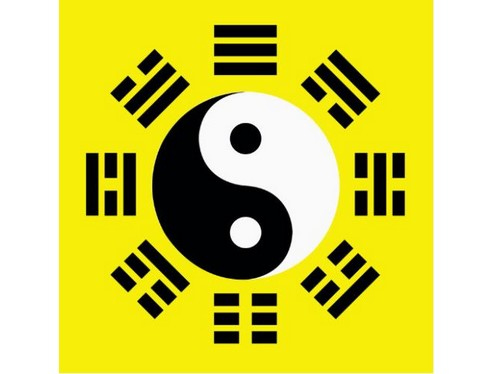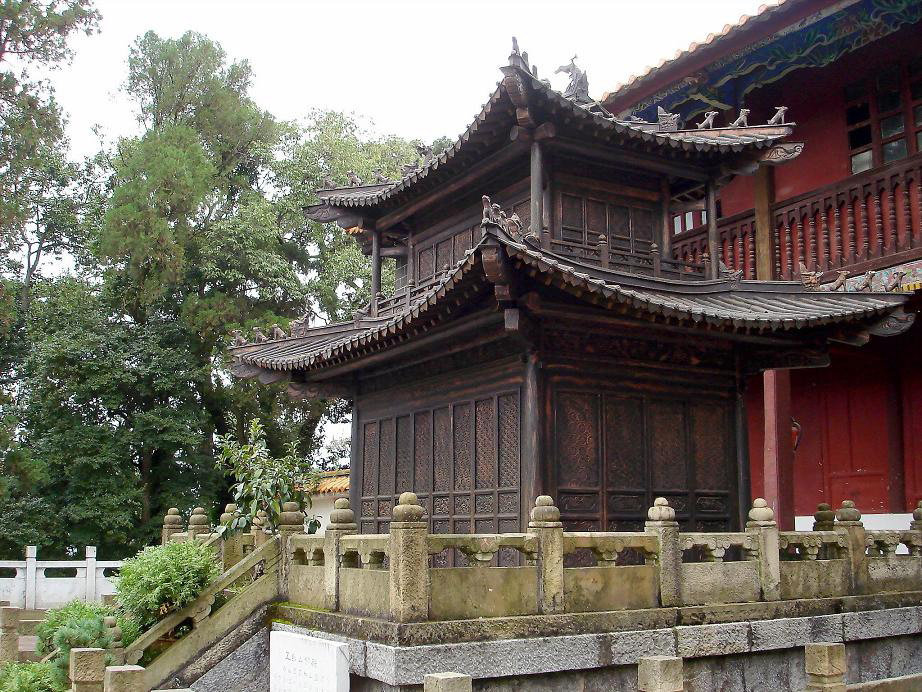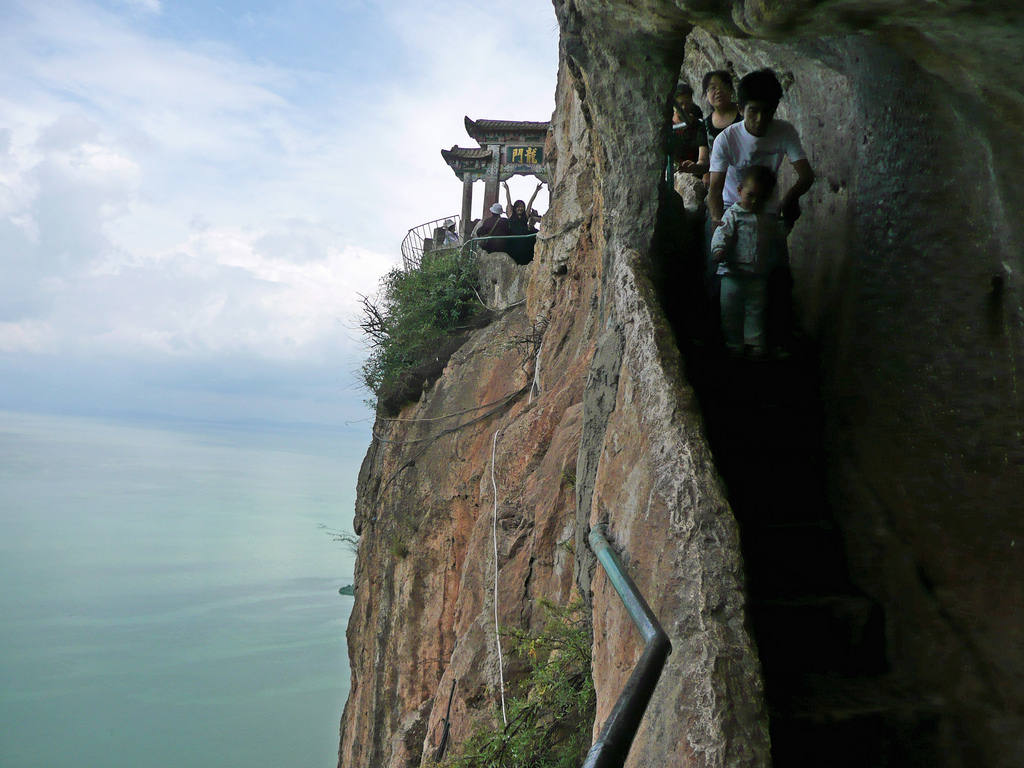


Eight diagrams-the symbol of Taoism
Taoism, also known as Daoism, is a religious or philosophical tradition of Chinese origin with an emphasis on living in harmony with, and in accordance to the natural flow or cosmic structural order of the universe commonly referred to as the Tao (道, also romanized as Dao). Taoist thought and philosophy was later incorporated into the religious traditions and practices of the ancient Chinese religion hundreds of years after its original development. The term Tao means the "natural way of the universe", "the way", "path", or "principle", and can also be found in other unrelated ancient Chinese philosophies and religions other than Taoism. In Taoism, however, Tao denotes something that is both the source of, and the force behind, everything that exists.

The golden temple in Kuming,Yunnan
Taoism drew its cosmological notions from the tenets of the School of Yin Yang, and is heavily influenced and informed by the acknowledged oldest text of ancient Chinese classics, the I Ching, which prescribes a system of philosophical thought on the ethics of human behaviours based on articulating cycles of change in the natural and social worlds by means of hexagrams, and includes instructions for divination practice still adhered to by modern-day religious Taoists.[1] Daoism, as Taoism is sometimes referred, diverged sharply from Confucian thoughts by scorning rigid rituals and social classes.[2] The Tao Te Ching, a compact and ambiguous book containing teachings attributed to Laozi (Chinese: 老子; pinyin: Lǎozǐ; Wade–Giles: Lao Tzu), is widely considered the keystone work of this philosophy. Together with the writings of Zhuangzi, which interprets and adds to the teaching of Laozi, these classic texts provide the philosophical foundation of Taoism deriving from the 8 trigrams (bagua) of Fu Xi in the 2700s BC in China, the various combinations of which creates the 64 hexagrams as documented in the I Ching.

The western hills in Kunming,Yunnan
Taoist propriety and ethics may vary depending on the particular school, but in general they tend to emphasize wu-wei (action through non-action), "naturalness", simplicity, spontaneity, and the Three Treasures: jing (sperm/ovary energy, or the essence of the physical body), qi (energy, including the thoughts and emotions), and Shén (spirit or spiritual power).
Taoism has had a profound influence on Chinese culture in the course of the centuries, and clerics of institutionalised Taoism (Chinese: 道士; pinyin: dàoshi) usually take care to note distinction between their ritual tradition and the customs and practices found in Chinese folk religion as these distinctions sometimes appear blurred. Chinese alchemy (especially neidan), Chinese astrology, Chan (Zen) Buddhism, several martial arts, traditional Chinese medicine, feng shui, and many styles of qigong have been intertwined with Taoism throughout history. Beyond China, Taoism also had influence on surrounding societies in Asia.
After Laozi and Zhuangzi, the literature of Taoism grew steadily and was compiled in form of a canon—the Daozang—which was published at the behest of the emperor. Throughout Chinese history, Taoism was nominated several times as a state religion. After the 17th century, however, it fell from favor.
Laozi is traditionally regarded as the founder of Taoism and is closely associated in this context with "original" or "primordial" Taoism. Whether he actually existed is disputed; however, the work attributed to him – the Tao Te Ching – is dated to the late 4th century BCE.
Taoism draws its cosmological foundations from the School of Naturalists (in the form of its main elements – yin and yang and the Five Phases), which developed during the Warring States period (4th to 3rd centuries BC).
Robinet identifies four components in the emergence of Taoism:
Philosophical Taoism, i.e. the Tao Te Ching and Zhuangzi
techniques for achieving ecstasy
practices for achieving longevity or immortality
exorcism.
Some elements of Taoism may be traced to prehistoric folk religions in China that later coalesced into a Taoist tradition. In particular, many Taoist practices drew from the Warring-States-era phenomena of the wu (connected to the shamanic culture of northern China) and the fangshi (which probably derived from the "archivist-soothsayers of antiquity, one of whom supposedly was Laozi himself"), even though later Taoists insisted that this was not the case. Both terms were used to designate individuals dedicated to "... magic, medicine, divination,... methods of longevity and to ecstatic wanderings" as well as exorcism; in the case of the wu, "shamans" or "sorcerers" is often used as a translation. The fangshi were philosophically close to the School of Naturalists, and relied much on astrological and calendrical speculations in their divinatory activities.
The first organized form of Taoism, the Tianshi (Celestial Masters') school (later known as Zhengyi school), developed from the Five Pecks of Rice movement at the end of the 2nd century CE; the latter had been founded by Zhang Daoling, who claimed that Laozi appeared to him in the year 142. The Tianshi school was officially recognized by ruler Cao Cao in 215, legitimizing Cao Cao's rise to power in return. Laozi received imperial recognition as a divinity in the mid-2nd century BCE.
Taoism, in form of the Shangqing school, gained official status in China again during the Tang dynasty (618–907), whose emperors claimed Laozi as their relative. The Shangqing movement, however, had developed much earlier, in the 4th century, on the basis of a series of revelations by gods and spirits to a certain Yang Xi in the years between 364 and 370.
Between 397 and 402, Ge Chaofu compiled a series of scriptures which later served as the foundation of the Lingbao school, which unfolded its greatest influence during the Song dynasty (960–1279). Several Song emperors, most notably Huizong, were active in promoting Taoism, collecting Taoist texts and publishing editions of the Daozang.
In the 12th century, the Quanzhen School was founded in Shandong. It flourished during the 13th and 14th century and during the Yuan dynasty became the largest and most important Taoist school in Northern China. The school's most revered master, Qiu Chuji, met withGenghis Khan in 1222 and was successful in influencing the Khan towards exerting more restraint during his brutal conquests. By the Khan's decree, the school also was exempt from taxation.
Aspects of Confucianism, Taoism, and Buddhism were consciously synthesized in the Neo-Confucian school, which eventually became Imperial orthodoxy for state bureaucratic purposes under the Ming (1368–1644).
The Qing Dynasty (1644–1912), however, much favored Confucian classics over Taoist works.
During the 18th century, the imperial library was constituted, but excluded virtually all Taoist books. By the beginning of the 20th century, Taoism had fallen much from favor (for example, only one complete copy of the Daozang still remained, at the White Cloud Monastery in Beijing).
Today, Taoism is one of five religions recognized by the People's Republic of China. The government regulates its activities through the Chinese Taoist Association. Taoism is freely practiced in Taiwan, where it claims millions of adherents.
You will only receive emails that you permitted upon submission and your email address will never be shared with any third parties without your express permission.
